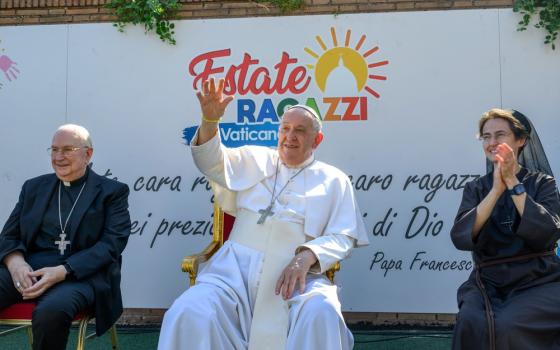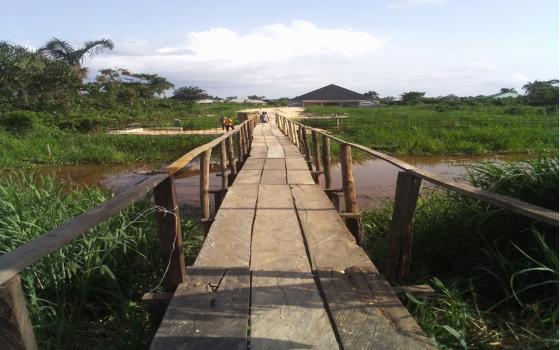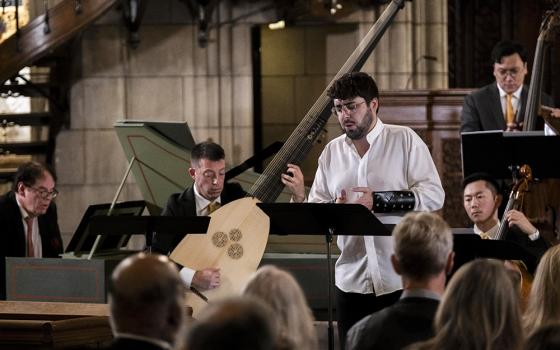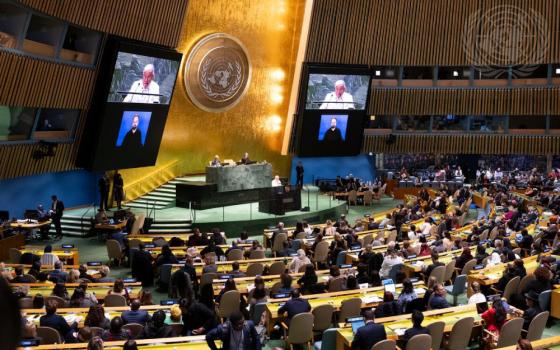In the downtown area of Mexico City, a man is seen wrapped in a plastic blanket. Josephine Sr. María Magdalena Silva Rentería said the lack of attention from authorities to address the migration crisis is causing hundreds of migrants to live in street conditions and uncertainty. (Luis Donaldo González)
At an international and interdisciplinary conference on migration held July 3-9 in Mexico City, human rights activist Josephine Sr. María Magdalena Silva Rentería denounced the government's lack of interest in addressing the migration crisis.
"Mexico City has become another border," Silva Rentería told the academics and researchers during the conference's open plenary session. "Two years ago, the migratory flow went up tremendously. We reported it to the government but they always have otros datos" — other statistics.
Silva Rentería's address was the first response to the panel "Im-mobilities and Human Rights in the Americas," which opened The Migration Conference 2024 at the Universidad Iberoamericana in Mexico City. Also participating in the panel were sociologist María Dolores París Pombo from Colegio de la Frontera Norte, Mexican Sen. Emilio Álvarez Icaza, and Karla Valenzuela, a professor from Universidad Iberoamericana and one of the conference's organizers.
For the past 13 years, Silva Rentería has worked with civil and faith-based organizations dedicated to assisting migrants passing through Mexico City on their way to the United States.
"This has allowed me to have a very extensive panorama of life and what is put at risk in these places," Silva Rentería said.
In addition to having coordinated the Red de Documentación de las Organizaciones Defensoras de Migrantes (REDODEM) — a network dedicated to recording the human rights violations that migrants suffer daily — Silva Rentería is the founder and director of the House of Welcome, Training and Empowerment for Migrant and Refugee Women and Families, or CAFEMIN.
Josephine Sr. María Magdalena Silva Rentería believes that government authorities have no interest in addressing the migratory crisis because, for them, 'migrants are nothing. They do not vote.'
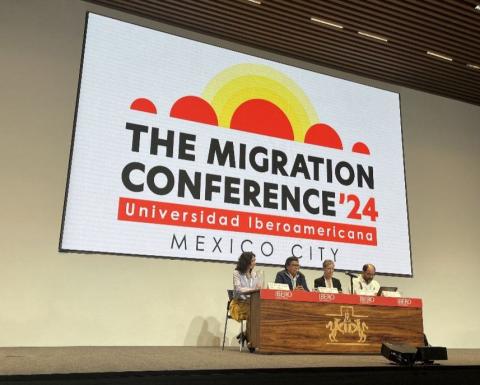
"Mexico City has become another border," Josephine Sr. María Magdalena Silva Rentería said during the opening plenary session titled "Im-mobilities and Human Rights in the Americas" at The Migration Conference 2024 at the Universidad Iberoamericana in Mexico City, July 3. From left: Karla Valenzuela, Silva Rentería, María Dolores París Pombo and Sen. Emilio Álvarez Icaza. (Luis Donaldo González)
But despite being the largest shelter in Mexico City, with the capacity to shelter 150 migrants (and at one point having to host 800), "nothing is ever enough," Silva Rentería said.
According to what migrants have shared with CAFEMIN, 90% of the women have suffered a rape along the way, while 60% have suffered more than two rapes. "They know this and come prepared, physically and biologically, with contraceptives. But the impact on their mental health is horrendous."
"Before we did not register sexual assaults in males," she added. But today, "the statistics have almost leveled off" between men and women.
Silva Rentería believes that government authorities have no interest in addressing the migratory crisis because, for them, "migrants are nothing. They do not vote."
According to Silva Rentería, these situations cause hundreds of migrants to live in street conditions and uncertainty in Mexico City.
"When we saw that the shelters were overflowing, we demanded that a place be opened. [The government] opened the Tláhuac shelter, which was a total failure. Not because they don't have funds," Silva Rentería said. She added that her fellow team offered assistance to Mexico City's government to run the shelter, but the government rejected it, as it only wanted publicity in the media.
"There is simply no will," she said.
During her 20-minute address, Silva Rentería highlighted the National Migration Institute's mismanagement. "They are dedicating themselves to beating and persecuting migrants," she said. "What they are doing is detaining — in the best of cases — detaining and deporting. At worst — and what we have witnessed — is handing them over to organized crime."
"I say this because we have documented cases," Silva Rentería said, adding that they at CAFEMIN manage to rescue about two for every 100 cases.
"Organized crime, by organizing, is the one who wins."
Four months ago, the sisters had to close CAFEMIN "because organized crime began to cobrarnos piso [to extort money from us]," Silva Rentería told GSR, adding that they are "gradually working to reopen our shelter."
'Mexico City has become another border. Two years ago, the migratory flow went up tremendously. We [sisters] reported it to the government but they always have otros datos' — other statistics.
According to sociologist and fellow panelist París Pombo, different actors abuse migrants nationwide. "There are widespread cases of extortion," she said. "Overlapping forms of violence are kidnapping and human trafficking, immigration detention and exploitation."
París Pombo also pointed to the tragic death of 40 migrants in a National Migration Institute detention center in March 2023. "Many people there had migratory documents but had not paid the extortion."
On his part, Sen. Álvarez Icaza remarked that Mexico is going through one of its worst migration management periods. The resources of the Mexican Agency for International Development Cooperation (AMEXCID) were used to fix the facilities used to detain Central American migrants, he said.
"AMEXID has been financing illegal prisons."
Silva Rentería pointed out that under President Andrés Manuel López Obrador's current government, the Mexican Commission for Refugee Aid has been tremendously diminished. "They have no human or economic resources to assist migrants."
"I don't have many expectations," Silva Rentería said of Claudia Sheinbaum, Mexico's president-elect, and of the incoming U.S. president. "Hopefully, they will surprise us."
In 2019, the Mexico City Human Rights Commission awarded Silva Rentería for her work with migrants and refugees.
"Some people ask me if I am afraid to be advocating, listening and touching this reality in the shelters," Silva Rentería said. "No, I am not afraid. I continue because I am a woman of hope."
"As Pope Francis says, in migrants we touch the flesh of Christ," she concluded.




